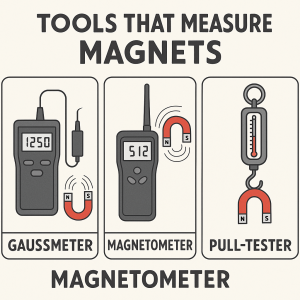Gauss, Pull, and Power: How to Measure the Strength of a Magnet
Magnets are essential tools across industries, from medical device manufacturing to retail display solutions. But when it comes to sourcing or evaluating magnets for your business, one of the most common questions is: How do you measure the strength of a magnet? Understanding this helps ensure you select the right magnet for performance, safety, and efficiency in your operations.
Tools That Measure the Strength of a Magnetic
Gaussmeters
A Gaussmeter measures magnetic field strength in units called Gauss. These instruments allow you to capture precise readings of the surface field of a magnet. For businesses that require accurate measurements, such as engineers testing magnetic assemblies or quality control departments, Gaussmeters provide reliable data. Professional Gaussmeters can cost thousands of dollars, but they deliver repeatable results that justify the investment for specialized industries.
Magnetometers
Magnetometers are versatile tools that measure strength in Gauss or in arbitrary units, making it easy to compare one magnet to another. While they may not offer the same pinpoint accuracy as high-end Gaussmeters, they are often more cost-effective and sufficient for applications where relative comparisons are all that’s needed, such as evaluating different magnets for retail fixtures or educational demonstrations.
Pull-Testers
Pull-testers take a different approach. Instead of measuring field strength, they measure the magnet’s holding power—how much force it takes to pull the magnet away from a steel plate. Results are given in pounds, kilograms, or other force units. For industries that depend on practical holding power, like signage, warehousing, or construction, pull-testers offer a direct way to evaluate if a magnet is strong enough for the job.

Choosing the Right Method for Your Business
The right measurement method depends on your goals:
- Precision testing: Choose a Gaussmeter for lab or engineering environments.
- Comparison testing: Use a magnetometer for side-by-side evaluations.
- Application testing: Rely on a pull-tester for real-world performance checks.
At Apex Magnets, we work with businesses every day to determine the right magnet strength for their needs. Whether you’re outfitting a manufacturing line, creating an interactive display, or sourcing custom magnetic solutions, our team can help you choose the right product and ensure consistent performance.
Measure with Confidence
Measuring the strength of a magnet isn’t just about numbers—it’s about ensuring your project or product performs exactly as intended. With tools like Gaussmeters, magnetometers, and pull-testers, you can select magnets with confidence and protect your investment.
For businesses needing accurate and versatile magnetic measurements, Apex Magnets offers the HT Digital Tesla/Gauss Magnetic Flux Meter—a reliable, cost-effective tool for measuring both DC (permanent magnets) and AC (electromagnetic fields). It features a one-touch peak hold function, easy toggling between Gauss and Tesla units, and on-screen polarity display. With a wide range of 10 Gauss to 20,000 Gauss (1 mT to 2000 mT) and accuracy of ±2%, it’s ideal for quality control, R&D, and field testing. The device includes a transverse probe, 9V battery, protective case, and user manual—making it ready for immediate use.
If you’re looking for guidance on which magnets best fit your business, explore our industrial magnets or reach out for a custom solution. Our experts are ready to help.
Shop Online and Follow Us to Learn More
At Apex Magnets, we offer tailored B2B solutions. Explore our B2B services to learn more or contact our team to discuss your specific application.
We offer a vast selection of magnets, so be sure to browse through them to find the perfect options for your specific needs. Subscribe to our monthly newsletter! You’ll be among the first to receive notifications about our latest blogs and our latest magnet deals.
If you need further assistance or have questions, please don't hesitate to contact us.
Magnets can be dangerous. Neodymium magnets, especially, must be handled with care to avoid personal injury and damage to the magnets. Fingers and other body parts can get severely pinched between two attracting magnets. Bones can be broken by larger magnets.
Visit our Magnet Safety page to learn more.

